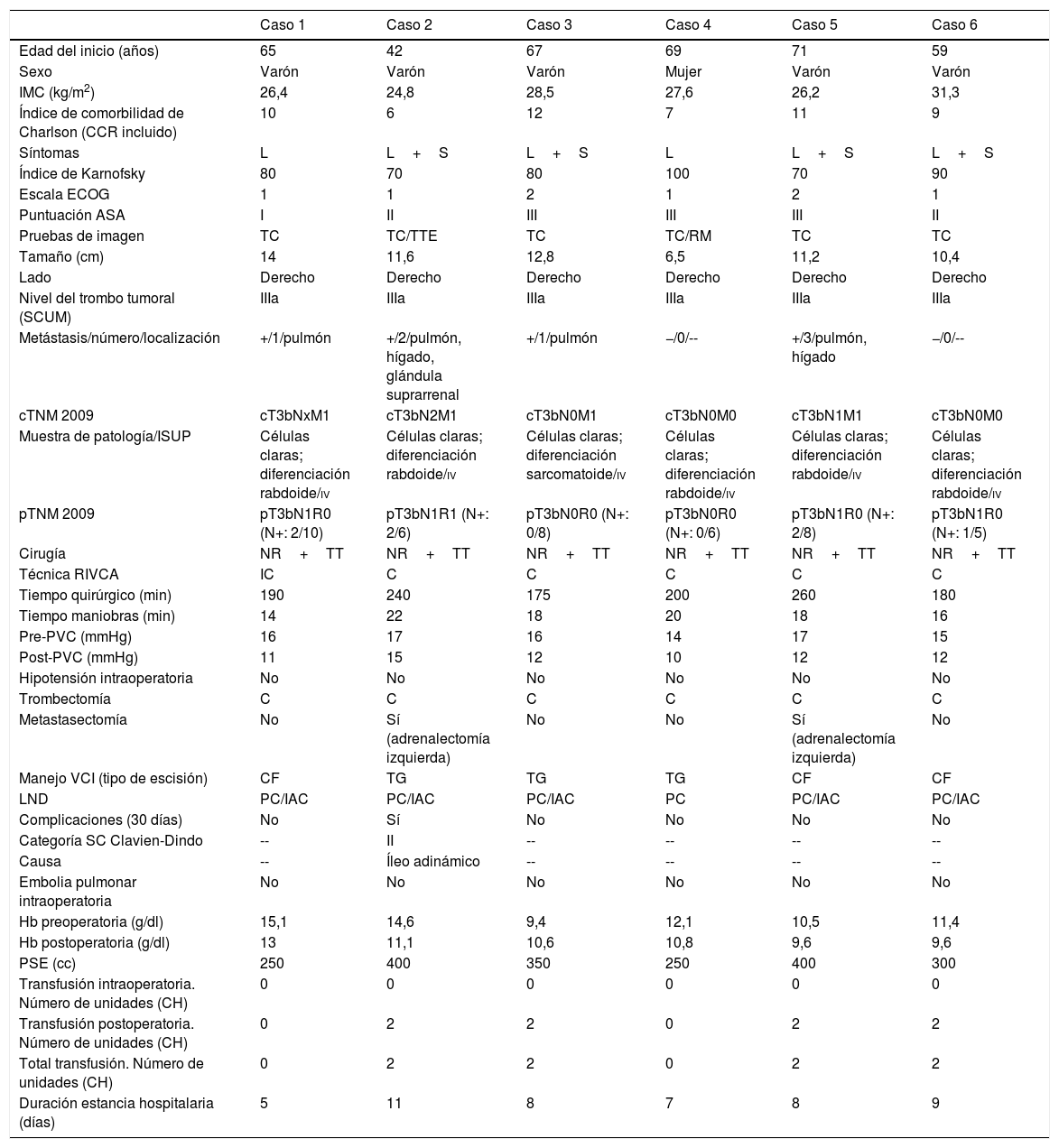Evaluar la seguridad y eficacia de la técnica de control de la vena cava inferior retrohepática por acceso anterior (RIVCA, por retrohepatic inferior vena cava control through an anterior approach) en el carcinoma de células renales (CCR) con trombo tumoral nivel iiia.
Pacientes y métodosSerie inicial de 6 casos que presentan CCR con trombo tumoral nivel iiia intervenidos de nefrectomía radical y trombectomía tumoral mediante la técnica RIVCA entre 2018-2019. El objetivo de la técnica RIVCA es obtener un control completo de la vena cava inferior retrohepática por encima de la porción craneal del trombo tumoral, pero excluyendo las venas hepáticas mayores con el fin de preservar la circulación hepatocava natural. Se proporciona la descripción paso a paso del procedimiento. Se registraron prospectivamente los rasgos de la enfermedad, así como las características y los resultados quirúrgicos.
ResultadosLa nefrectomía radical y la trombectomía tumoral se completaron en todos los casos. La técnica RIVCA no aumentó significativamente el tiempo quirúrgico (rango: 14-22min). La media de sangrado estimado fue de 325cc (rango: 250-400). No se requirió transfusión de sangre intraoperatoria en ningún caso. La media de unidades de concentrados de hematíes transfundidos por paciente en el período postoperatorio fue de 1,3 (rango: 0-2). No hubo casos de embolia pulmonar intraoperatoria ni se produjeron complicaciones mayores (Clavien-Dindo III-V) en el período postoperatorio a 30 días. La estancia hospitalaria postoperatoria (mediana) fue de 8 días (rango: 5-11).
ConclusionesLa técnica RIVCA aplicada a los casos de CCR y trombo tumoral nivel iiia proporciona un control completo de la vena cava inferior retrohepática por encima de la porción craneal del trombo tumoral, a la vez que evita la inestabilidad hemodinámica intraoperatoria al mantener la precarga cardíaca a través del circuito portocava. Esta técnica puede limitar la morbilidad operatoria (embolia pulmonar intraoperatoria y hemorragia masiva), convirtiéndose así en un complemento de gran utilidad en casos de CCR con trombo tumoral de nivel iiia.
To evaluate the safety and efficacy of the retrohepatic inferior vena cava control through an anterior approach (RIVCA) technique in renal cell carcinoma (RCC) with level iiia tumor thrombus.
Patients and methodsInitial series of 6 cases presenting RCC and level iiia tumor thrombus who underwent radical nephrectomy and tumor thrombectomy using the RIVCA technique between 2018-2019. RIVCA technique aims to gain complete control of the retrohepatic inferior vena cava above the cranial end of the tumor thrombus, but excluding the major hepatic veins in order to preserve the natural hepato-caval shunt. A step-by-step description of the procedure is provided. Disease features, operative characteristics, and surgical outcomes were registered prospectively.
ResultsRadical nephrectomy and tumor thrombectomy were completed in all cases. RIVCA technique did not increase operative time significantly (range: 14-22min). Mean estimated blood loss was 325cc (range: 250-400). Blood transfusion was not required intraoperatively in any of the cases. Mean postoperative transfusion rate was 1.3 red blood cells packed units (range: 0-2). There were no cases of intraoperative pulmonary embolism or major complications (Clavien-Dindo III-V) in the period of 30 days postoperatively. Median postoperative length of stay was 8 days (range: 5-11).
ConclusionsThe RIVCA technique applied to cases of RCC and level iiia tumor thrombus provides complete control of the retrohepatic inferior vena cava above the tumor thrombus cranial end, while prevents intraoperative hemodynamic instability by maintaining cardiac preload through the porto-caval shunt. This technique may limit operative morbidity (intraoperative pulmonary embolism and massive hemorrhage), thus becoming a helpful adjunct to be used in cases of RCC with level iiia tumor thrombus.














